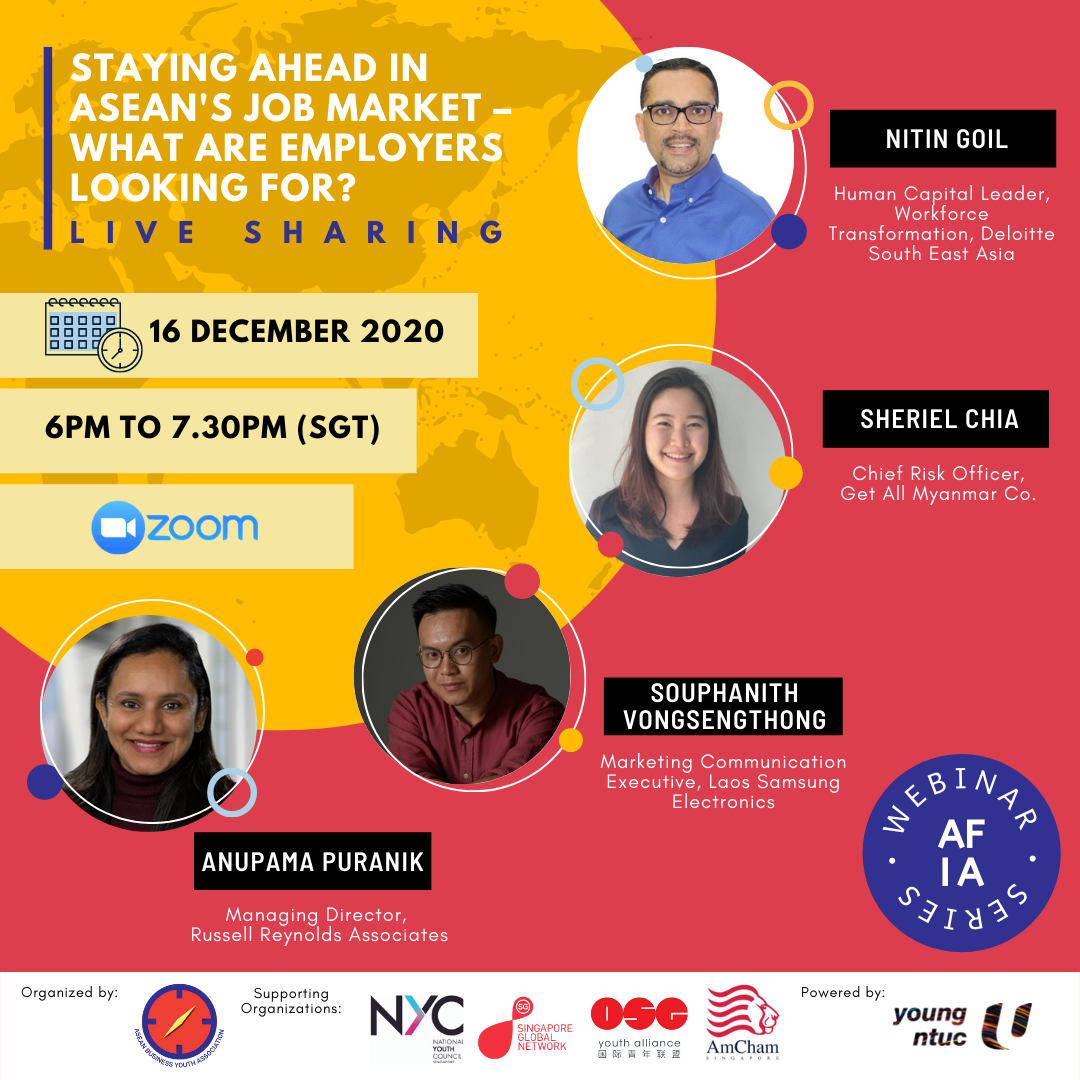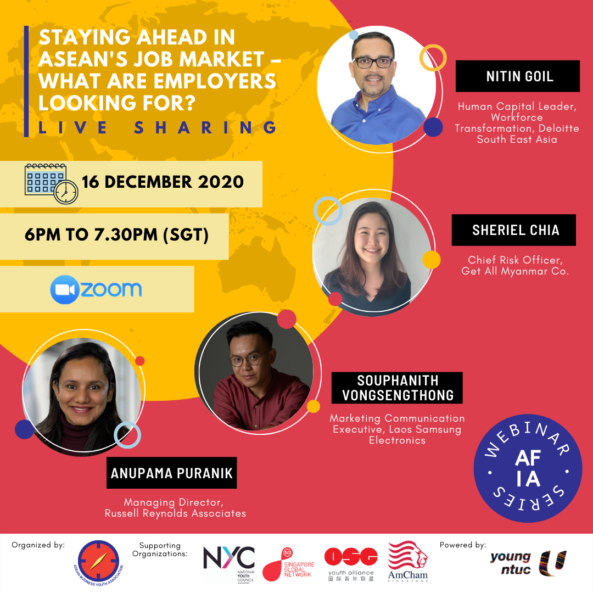
On 16 December 2020, ABYA had the privilege to host Anupama Puranik, Managing Director of Russell Reynolds, a global executive search firm, heading the healthcare practice, and Sheriel Chia, the Chief Risk Officer at Get All Myanmar Co., with Souphanith Vongsengthong (Marketing Communication Executive, Laos Samsung Electronics) moderating the panel.
Written by: Wesley Tan
Edited by: Isabelle Goh
In an increasingly competitive and globalized job market, possessing core skills and competencies is vital to securing careers that fit our aspirations. However, many fresh graduates fall short in meeting the expectations of recruiters: 47% of employers deem the lack of technical skills and knowledge as the greatest impediment in hiring for entry-level positions, whereas the dearth of overseas experience is cited as one of the greatest obstacles in recruiting Singaporean professionals. (AmCham, 2020) As economic integration intensifies within ASEAN, job-seekers are faced with new opportunities and challenges: enhanced mobility of talent and services provide suppliers with more openings in the region, whereas unfettered HR regulations may raise the bar for applicants in a larger talent pool.
How can youths better equip themselves with competitive skill sets to succeed in tomorrow’s job market?
Personal Experiences
For both Sheriel and Anupama, it is evident that their careers required adapting to different circumstances amidst a variety of different industries. For instance, Anu started her career in investment banking for thirteen years before beginning her second career in executive search in Singapore. Meanwhile, Sheriel started her career as a consultant at Deloitte before working at Get All Myanmar Co.
In recounting their travel experiences, Sheriel talked about the differences between visiting as a tourist, a consultant (providing professional services) and working in a company based in Myanmar full-time. While adapting to different roles, Sheriel had to constantly reflect on how to root herself in a new country and how to better understand the culture. This rigorous questioning allowed her to better understand what the local community perceives as valuable and how to tailor the company’s services towards addressing this demand.
Anupama first came to Singapore as a trailing spouse, thus having to start her career from scratch, with investment banking. As much as it was physically and mentally taxing, Anupama reflected how it was rewarding to learn to adapt to the Singaporean context, transitioning from the environment in India. Ultimately, she particularly likes how Singapore is a melting pot of cultures, embracing the principles of multiculturalism and diversity.
1. Reflection and Developing Oneself
Beyond technical skills and academics, Sheriel and Anu stressed the importance of developing oneself. The importance of one’s individuality, developing one’s unique value proposition was underscored. ‘What skills do you wish to develop to attain the goals you’ve set for yourself? What is distinct about you?’ are questions one would need to reflect on, in this journey.
From a recruiter’s point-of-view, students who are able to show confidence and bring a diversity of experience to the table will be able to value-add to the company. Rather than ticking off a checklist or a stipulated formula, youths need to gain an array of different experiences culturally. Beyond technical skills, recruiters constantly question how a new hire could viably value-add and fit into the company culture! Ultimately, HR recruiters can discern whether you are being true to yourself, whether you are able to acknowledge what you do not know; authenticity goes a long way!
Hence, it is only through rigorous self-reflection that one can discern one’s priorities and come off as genuine.
2. Building a Sustainable Career Progression
Secondly, in terms of career progression, one must be willing to learn and adapt to different job-scopes and situations, planning your CV such that it shows resilience to an array of circumstances. Even if youths don’t have overseas experiences, they must show that they can adapt to new environments. Using the COVID-19 pandemic as an example, Sheriel advises youths to be able to adapt to unprecedented circumstances, showing interviewers that they are able to do so. For Sheriel, she gained a source of fulfilment from social entrepreneurship and community service, and thus does this in a local context via grocery delivering to the underprivileged even though she is unable to travel at the moment.
Meanwhile, Anu advises new graduates not to “job hop” overly frequently. Rather, graduates should look towards sustainable development and building credibility within one organization, get used to a single organization, that you have the ability to take on different roles and capacities. Doing so will allow you to show that you are committed to a cause and are adaptable to a variety of positions, increasing your marketability to future employers.
3. Risk-taking and Discomfort
Thirdly, youths must be used to discomfort in building resilience, expanding your comfort zone while not going beyond your comfort zone to the point of mental health risks. Succeed and failures are transient. Anu advises graduates not to “let it get to your head” when you succeed, instead reflecting on why you succeeded. To add on, Sheriel states that there are many rewards you miss out when you don’t take risks in your career. As such, graduates should be eager to try new experiences, investing in stretching yourself through taking a part-time internship while juggling studies. Ultimately, as we enter the Fourth Industrial Revolution, being able to absorb new experiences and leverage on Singapore’s multiculturalism is particularly crucial, along with keeping your learning muscle active to absorb new skill sets constantly even after attaining a job.
Most importantly, students should not expect full certainty in attaining a job, get rid of the mentality that “doing A would attain B”. After all, companies are not looking at Singaporeans, but the entire world! ASEAN is a highly dynamic region, with Indonesia’s growing unicorns and Myanmar’s recent digitalization, leapfrogging into the 4IR. Increasingly, youths must look beyond being an individual contributor via specialization to a broad-based leader-cum-generalist. To end off, Sheriel and Anu both highlighted the importance of aligning your goals and actions, thinking deeply into what you want – being constantly unsatisfied simply leads to a quarter-life crisis, where one is unable to be satisfied with one’s current circumstances.
Thank you to the speakers for your insights and to our members for tuning in. We would also like to thank our supporting organizations, for their continued support for ABYA.




